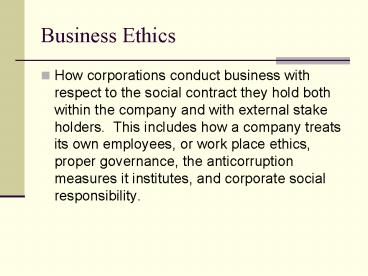Business Ethics - PowerPoint PPT Presentation
1 / 16
Title:
Business Ethics
Description:
... and facilities that transforms raw materials into products delivered to ... just the necessary and no more (Create stronger limits when dealing with a ... – PowerPoint PPT presentation
Number of Views:102
Avg rating:3.0/5.0
Title: Business Ethics
1
Business Ethics
- How corporations conduct business with respect to
the social contract they hold both within the
company and with external stake holders. This
includes how a company treats its own employees,
or work place ethics, proper governance, the
anticorruption measures it institutes, and
corporate social responsibility.
2
Supply Chain Information Sharing
- A supply chain is a network of organizations and
facilities that transforms raw materials into
products delivered to customers (Chapter 8, 239). - Supply chain information sharing is the exchange
of queries amongst parties with in the supply
chain.
3
Ethics of Supply Chain Information Sharing
- Situation A
Retailer is running low on inventory. Therefore
supplier increases price by 15 Due to
transportation cost increase.
4
- Is the price increase legal?
- Yes. The supplier is not braking any laws in
order to increase the price. It is just the
utilization of an economical advantage. - Is it ethical to do so, and also to blame it on
transportation increase? - No. The use of false information is ethically
inappropriate on a business transaction,
regardless of the parties involved. Although it
is a common practice behind the closed doors of
one of the parties involve on the exchange.
5
- What are some of the long term consequences?
- The supplier may lose the client on the long run.
- The retailer may want to start bidding in order
to get more competitive prices. - The supplier may not sell it inventory, due to
high pricing. - A competitor may see this as an opportunity to
step in with competitive prices.
6
Situation B
- Retailer is running low on inventory.
Therefore supplier increases price by 15 Due
to transportation cost increase. At the same
time competitor is building inventory on
retailers desired items and does not increase
prices. Therefore the competition ends up with
the final sale.
7
- Is it legal to analyze the data to estimate you
competitors inventory levels? - Yes. This is common practice on todays world.
It is just appropriate research, in order to stay
in business. - It is Ethical, and would you recommend this kind
of analysis? - It is ethical because the data use for such
studies is accessible to the public. - We would recommend to exploit any possible means
within the legal boundaries. In order to stay
ahead of the competition.
8
Situation C
- Retailer and supplier have agreed on exchange of
query, but only on the orders that they have with
each other. A flaw in the system allows the
supplier to observe the queries of all
competitors.
9
- Should you take the responsibility of informing
about the flaw in the system? - Depends on how ethical the supplier is. In an
ideal world yes. This would make you look as a
responsible and honest entity.
10
- What are the consequences if the problem is not
revealed? - There should not be any consequences, as long
as the information is no utilized by the
supplier. - The retailer may find out about the flaw, and
remove the supplier from the supply chain. - The supplier may enter into a legal dispute.
Because the retailer can think that the supplier
violated the nondisclosure agreements.
11
Situation D
- Same scenario as situation C, but now one of the
suppliers developers writes a program to exploit
the flaw in the system. Therefore access to the
retailers inventory, sales and order data is
available to the supplier.
12
- Should you take the responsibility of informing
about the flaw in the system? - Depends on how ethical the supplier is. In an
ideal world yes. This would make you look as a
responsible and honest entity. - (Same answer as in Situation C)
13
- What are the consequences if the problem is not
revealed? - In this case the supplier may be confronted with
the same consequences as in Situation C. But
also it may - Legal actions. (Fines, Jail, Loss of Licenses)
- Going out of business, due to malpractice.
- Loss of costumers, due to poor credibility.
- Loss of any competitive advantage in their field.
14
- Is it illegal or ethical to benefit from this
mistake? - ILLEGAL.
15
How can we avoid the misuse of ones own system?
- The utilization of proprietary designs.
- Follow the E-Commerce statutes.
- Good interaction between SRM (supplier
relationship management) and CRM (customer
relationship management).
16
- Utilization of standardized programs (with
different security levels). - Reveal just the necessary and no more (Create
stronger limits when dealing with a member of
other company). - Legal documentation (nondisclosure agreements)































